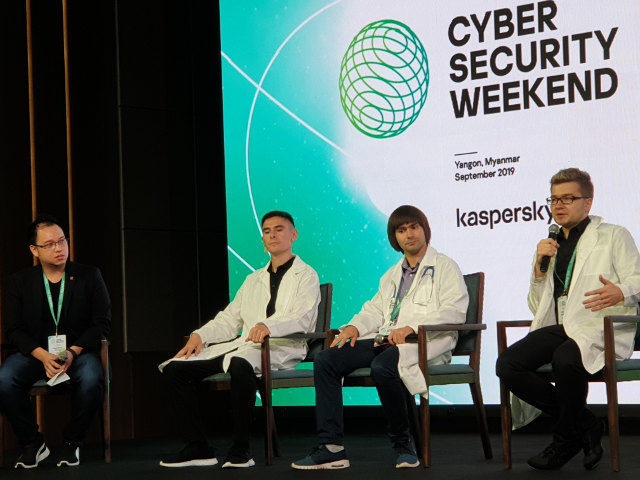“76% of devices in healthcare facilities in PH infected by malicious code. The Philippines has the most number of infected medical devices in Southeast Asia, and is second worst among countries in the world after Venezuela, experts Kaspersky say”
We are happy to bring a solution to the Ecozones, LGUs, Government Agencies and Private Industry with our partner Microsoft and CyberProof (the first risk based offering with Artifical Intelligence built into our managed services). We look forward to working with DICT, DILG and other agencies to lower capital expenses and provide a Total Solution approach for our clients throughout the Philippines.
The following is the article posted on the Rappler Website:
 Kyle Chua of Rappler: Published 12:15 PM, September 14, 2019 and Updated 10:48 AM, September 16, 2019
Kyle Chua of Rappler: Published 12:15 PM, September 14, 2019 and Updated 10:48 AM, September 16, 2019
MEDICAL CYBERSECURITY. Kaspersky cybersecurity experts discuss the state of security at medical institutions at an event in Yangon, Myanmar. Photo by Kyle Chua
YANGON, Myanmar – The rapid advancement of technology is transforming the healthcare industry tremendously. From the use of artificial intelligence in medical diagnostics to 5G-powered remote surgeries, the hospitals of today boast a level of interconnectivity that in previous years only seemed possible in science fiction movies.
These innovations, however, have given cybercriminals opportunities to target the industry and exploit its vulnerabilities for their own gain.
“We’re definitely entering the era of the ultra-connected medicine. And I have to say that, while we welcome these advancements, we cannot deny that these will open wider doors for cybercriminals,” said Yury Namestnikov, head of global research and analysis team for global cybersecurity research firm Kaspersky.
In 2017, the so-called WannaCry ransomware locked down over 200,000 computers in various countries around the world, rendering them unusable. Some of the computers that were hit by the attack were from hospitals across the UK, cancelling more than 19,000 doctor’s appointments. Last year, Singhealth, Singapore’s largest healthcare network, was the victim of a data breach that compromised the personal data of 1.5 million of its members, including the country’s Prime Minister Lee Hsien Loong.
State of infection
The overall number of medical devices attacked worldwide in 2019 have since declined at least a third than in previous years, according to Kaspersky.
These numbers are not observed everywhere however, as the Philippines is said to have had the most number of infected medical devices in Southeast Asia this year and second among countries in the world, behind Venezuela.
At the firm’s annual Cyber Security Weekend gathering in Yangon, Myanmar, Namestnikov said 76% of devices in healthcare facilities in the Philippines were infected by malicious code. More than 7 in 10 medical devices, he said, had some sort of cybersecurity problem. These devices include servers, computers, tablets, gadgets, and hospital machines connected to the internet.
He explained these aren’t necessarily intentional or orchestrated attacks from cybercriminals – most of the infections they found are likely the result of people using USB drives that they might not have known contained viruses – but they are still believed to be capable of doing damage.
For instance, infections can cause machines to malfunction, which can lead to a potential medical misdiagnosis, a shutdown of facilities, or the death of patients. It can also spread to other devices and make them vulnerable to other attacks in the future.
Projections point to health organizations incurring economic losses of around $23.3 million from cybersecurity incidents.
Bangladesh and Thailand were two other Asia Pacific countries that were in the top 15 countries with the most detected infections, logging 58% and 44% respectively.
Kaspersky’s findings appear to confirm a suspicion that the threat is creeping towards the region – a threat which shares something in common with a nuclear fallout, according to Vitaly Kamluk, Kaspersky’s director of global research and analysis team for Asia Pacific.
“A naked eye cannot see how the radiation from the decades-long incident have been affecting human health until present times. Likewise, the healthcare sector has yet to clearly diagnose the plague that has been causing damage to the industry and potentially affecting human health,” explained Kamluk.
The question is: Why are cyber criminals targeting the healthcare industry?
Data-driven industry
Without question, data, in whatever shape or form it takes, has in recent years become one of the most valuable and sought-after commodities in the world. This includes medical data, which Kaspersky security researcher Seongsu Park said is even more valuable than a person’s credit card.
When a person loses his credit card, he can always have it deactivated and sign up for a new one. It’s not that simple with medical data because records, test results, medication, and other important patient information cannot be easily changed. Losing them could mean patients have to take some tests again to get medicated, for example. And for some patients, the information in their medical data could mean life or death.


No Comment